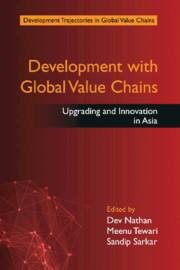Book contents
- Frontmatter
- Contents
- List of Tables and Figures
- 1 Introduction
- 2 The Changing Landscape of Contract Manufacturers in the Electronics Industry Global Value Chain
- 3 Gaining Process Rents in the Apparel Industry: Incremental Improvements in Labour and Other Management Practices
- 4 New Economic Geographies of Manufacturing in China
- 5 The Philippines: A Sequential Approach to Upgrading in Manufacturing Global Value Chains
- 6 Learning Sequences in Lower Tiers of India's Automotive Value Chain
- 7 Innovation and Learning of Latecomers: A Case Study of Chinese Telecom-Equipment Companies
- 8 From the Phased Manufacturing Programme to Frugal Engineering: Some Initial Propositions
- 9 Industrial Upgrading in the Apparel Value Chain: The Sri Lanka Experience
- 10 Strategic Change in Indian IT Majors: A Challenge
- 11 Moving from OEM to OBM? Upgrading of the Chinese Mobile Phone Industry
- 12 Indian Pharmaceutical Industry: Policy and Institutional Challenges of Moving from Manufacturing Generics to Drug Discovery
- 13 Revisiting the Miracle: South Korea's Industrial Upgrading from a Global Value Chain Perspective
- 14 Evolutionary Demand, Innovation and Development
- 15 GVCs and Development Policy: Vertically Specialized Industrialization
- Contributors
- Index
1 - Introduction
Published online by Cambridge University Press: 01 November 2018
- Frontmatter
- Contents
- List of Tables and Figures
- 1 Introduction
- 2 The Changing Landscape of Contract Manufacturers in the Electronics Industry Global Value Chain
- 3 Gaining Process Rents in the Apparel Industry: Incremental Improvements in Labour and Other Management Practices
- 4 New Economic Geographies of Manufacturing in China
- 5 The Philippines: A Sequential Approach to Upgrading in Manufacturing Global Value Chains
- 6 Learning Sequences in Lower Tiers of India's Automotive Value Chain
- 7 Innovation and Learning of Latecomers: A Case Study of Chinese Telecom-Equipment Companies
- 8 From the Phased Manufacturing Programme to Frugal Engineering: Some Initial Propositions
- 9 Industrial Upgrading in the Apparel Value Chain: The Sri Lanka Experience
- 10 Strategic Change in Indian IT Majors: A Challenge
- 11 Moving from OEM to OBM? Upgrading of the Chinese Mobile Phone Industry
- 12 Indian Pharmaceutical Industry: Policy and Institutional Challenges of Moving from Manufacturing Generics to Drug Discovery
- 13 Revisiting the Miracle: South Korea's Industrial Upgrading from a Global Value Chain Perspective
- 14 Evolutionary Demand, Innovation and Development
- 15 GVCs and Development Policy: Vertically Specialized Industrialization
- Contributors
- Index
Summary
This book is in many ways a follow-up to our earlier edited book (Nathan, Tewari and Sarkar, 2016). While that book dealt with labour conditions and labour issues in global value chains (GVCs) in Asia, this book deals with the manner in which upgrading and innovation have taken/can take place in GVCs; once again, with a focus on the Asian experience.
This ‘Introduction’ starts out by listing the various dimensions of a GVC; within this, emphasis is placed on the GVC as embodying a division, albeit a changing division, of knowledge and capabilities across geographies. After this, we define the ways in which firms may or may not strategically interact with GVCs. This is followed by listing the different types of upgrading, commonly discussed in the GVC literature. However, different types of upgrading enable the capture of rents, whether process or product rents, which are discussed in the next section. This passage through different types of rents itself depends on the manner in which knowledge is developed, both within and around value chains.
Thus, this introduction stresses upon a scheme where knowledge (which results in both process and product innovations and their corresponding rents) is crucial to development within and around value chains. There are many analyses of innovation, and in the context of many countries having made it from low-income to middle-income status, there is much discussion of the ‘middle-income trap’. Some books on the challenges of China's current economic development explicitly place it in the context of overcoming the middle-income trap (for example, Woo et al., 2012; David Shambaugh, 2016; Lewin, Kenney and Murmann, 2016).
Through case studies in Asian countries such as China, India, the Philippines, South Korea, and Sri Lanka, with an examination of diverse industries (electronics, telecom equipment, mobile phones, pharmaceuticals, automobiles, and even garments) this book looks at facets of the processes of industrial catch-up (Nayyar, 2013) and life after catch-up in the context of GVCs. How do firms and economies upgrade and innovate and move from being suppliers to becoming headquarter economies (Baldwin, 2016) or, in GVC-terms, how do firms in these economies becoming lead firms?
Information
- Type
- Chapter
- Information
- Development with Global Value ChainsUpgrading and Innovation in Asia, pp. 1 - 19Publisher: Cambridge University PressPrint publication year: 2019
Accessibility standard: Unknown
Why this information is here
This section outlines the accessibility features of this content - including support for screen readers, full keyboard navigation and high-contrast display options. This may not be relevant for you.Accessibility Information
- 1
- Cited by
